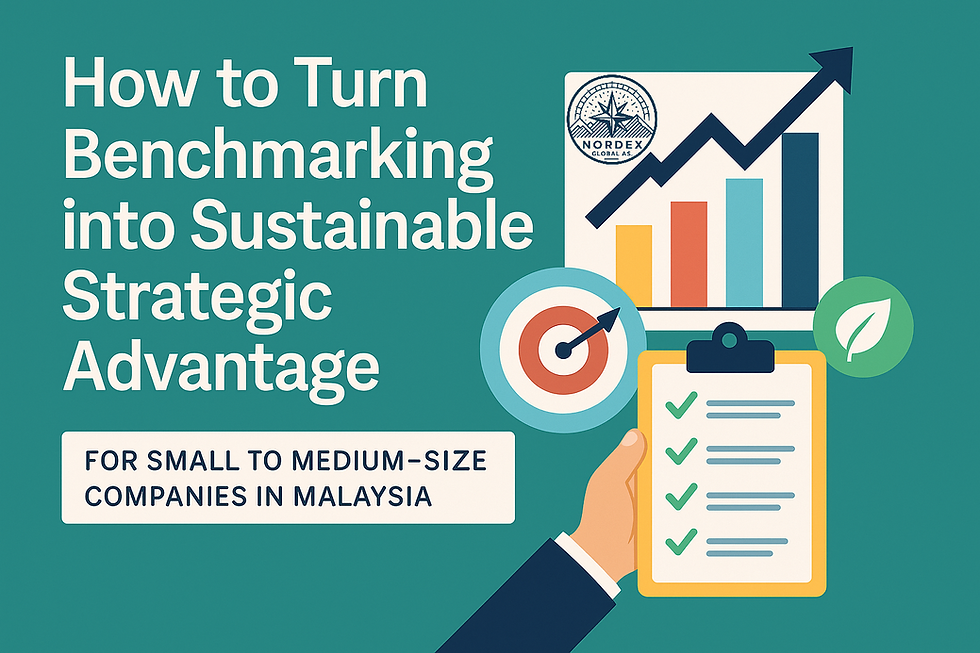Turning Benchmarking into Sustainable Strategic Advantage — A Key Point for Malaysian SMEs
- Ibarahim Sohel

- Aug 28, 2025
- 3 min read

For small and medium-sized enterprises (SMEs) in Malaysia, benchmarking is often treated as a reporting exercise numbers in, numbers out. But in today’s competitive and sustainability-driven market, benchmarking can do much more. Done right, it becomes a strategic tool to cut costs, strengthen resilience, and open doors to international markets.
At Nordex Global, we believe benchmarking is one of the fastest and most affordable ways for SMEs to create both financial and sustainability value.
Why Benchmarking Matters Now
Market Access: European buyers and regional supply chains increasingly demand data on energy, carbon, and quality performance. Benchmarking allows SMEs to present comparable, credible figures that buyers trust.
Cost & Efficiency: By normalising data—such as kWh per unit or water per tonne—benchmarking highlights where waste occurs and where efficiency can be gained.
Financing & Growth: Banks, investors, and even local authorities prefer businesses that can demonstrate measurable improvements backed by benchmarks.
Reputation & Talent: Clear improvements in safety, sustainability, and quality boost brand credibility and attract skilled workers.
What Good Benchmarking Looks Like
Apples-to-apples comparisons: Focus on intensity metrics (energy per unit, carbon per RM revenue) instead of raw totals.
Peer relevance: Benchmark against SMEs of similar size and processes, both within ASEAN and against global leaders.
Balanced indicators: Track operational, sustainability, and people-related metrics.
Decision-ready: Every metric should lead to a clear initiative, owner, and timeline.
A Simple 7-Step Roadmap
Define your goal – Is it reducing costs, cutting emissions, or qualifying for a buyer contract?
Select peers – Use both local competitors and global references.
Choose the right metrics – Operations, energy, carbon, safety, and supply chain.
Build a clean baseline – Collect the last 12 months of data and normalise.
Identify the top 3–4 gaps – Focus on the ones that drive the most cost and risk.
Translate into strategy – Link gaps to initiatives with owners, budgets, and ROI timelines.
Review and communicate – Update monthly, share quarterly with buyers, and publish progress annually.
Quick Wins in 90 Days
Fix compressed air leaks and idle machine energy waste.
Apply first-article checks to cut defect rates.
Reduce water use in rinsing and improve waste segregation.
Strengthen safety with near-miss reporting.
Get your top suppliers to sign your Code of Conduct.
Longer-Term Moves
Solar via PPA – reduce emissions with no heavy capex.
ISO certifications – formalise environmental and safety systems.
Digital traceability – meet buyer expectations for supply chain transparency.
Carbon targets & waste valorisation – align with global standards like SBTi.
Pitfalls to Avoid
Comparing with the wrong industry or company size.
Tracking too many metrics—stick to 8–10 that matter.
Reporting totals instead of per-unit figures.
Seeking certifications without changing processes.
Case Example
A Penang-based machining SME benchmarked its energy and quality performance. The results showed 18% higher energy use and 30% higher defect rates than peers. Within 12 weeks, the company implemented targeted actions: compressed air fixes, operator training, and better shutdown practices. Energy use fell by 14% and defects by 22%. Their European customer upgraded them to a preferred supplier list, securing a new two-year contract.
This is the real power of benchmarking—it converts data into contracts, cost savings, and credibility.
What Nordex Global Thinks
At Nordex Global, we see benchmarking as the gateway to ESG advantage for SMEs. Many businesses hesitate to start ESG work because they fear it’s too costly or complex. Benchmarking proves otherwise: it’s practical, affordable, and directly linked to ROI.
We support SMEs by:
Designing industry-specific scorecards for manufacturing and agriculture.
Providing baseline and peer comparisons against EU buyer expectations.
Turning gaps into a clear action roadmap with measurable returns.
Guiding companies through ESG reporting and buyer communication.
Final Word
Benchmarking is not a luxury for large corporations but it’s a strategic weapon for Malaysian SMEs. It helps you measure where you stand, act on what matters, and prove your value to buyers and financiers.
At Nordex Global, we believe benchmarking transforms ESG from a compliance cost into a competitive advantage. With the right approach, Malaysian SMEs can not only catch up with global standards—but lead the way.





Comments